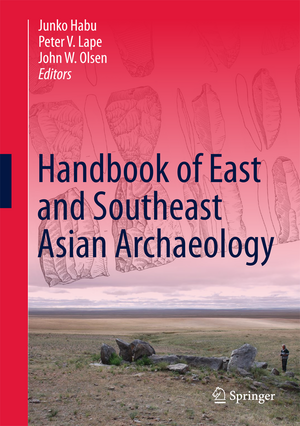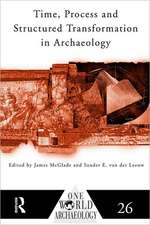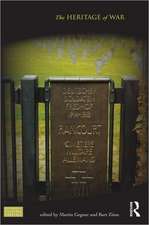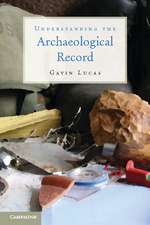Handbook of East and Southeast Asian Archaeology
Editat de Junko Habu, Peter V. Lape, John W. Olsenen Limba Engleză Hardback – 8 dec 2017
The Handbook augments archaeologically-focused chapters contributed by regional scholars by providing histories of research and intellectual traditions, and by maintaining a broadly comparative perspective. Archaeologically-derived data are emphasized with text-based documentary information, provided to complement interpretations of material culture. The Handbook is not restricted to art historical or purely descriptive perspectives; its geographical coverage includes the modern nation-states of China, Mongolia, Far Eastern Russia, North and South Korea, Japan, Taiwan, Vietnam, Cambodia, Laos, Thailand, Burma, Malaysia, Indonesia, the Philippines and East Timor.
| Toate formatele și edițiile | Preț | Express |
|---|---|---|
| Paperback (1) | 2098.36 lei 39-44 zile | |
| Springer – 29 aug 2018 | 2098.36 lei 39-44 zile | |
| Hardback (1) | 2509.84 lei 6-8 săpt. | |
| Springer – 8 dec 2017 | 2509.84 lei 6-8 săpt. |
Preț: 2509.84 lei
Preț vechi: 3060.77 lei
-18% Nou
Puncte Express: 3765
Preț estimativ în valută:
480.25€ • 500.44$ • 397.65£
480.25€ • 500.44$ • 397.65£
Carte tipărită la comandă
Livrare economică 03-17 aprilie
Preluare comenzi: 021 569.72.76
Specificații
ISBN-13: 9781493965199
ISBN-10: 1493965190
Pagini: 1099
Ilustrații: XXI, 771 p. 135 illus., 76 illus. in color.
Dimensiuni: 178 x 254 x 51 mm
Greutate: 1.58 kg
Ediția:1st ed. 2017
Editura: Springer
Colecția Springer
Locul publicării:New York, NY, United States
ISBN-10: 1493965190
Pagini: 1099
Ilustrații: XXI, 771 p. 135 illus., 76 illus. in color.
Dimensiuni: 178 x 254 x 51 mm
Greutate: 1.58 kg
Ediția:1st ed. 2017
Editura: Springer
Colecția Springer
Locul publicării:New York, NY, United States
Cuprins
Section I: History and Practice.- Section II: Early Occupations of Asia.- Section III: Changing Human-Environment Relations from Late Pleistocene to Early Holocene.- Section IV: Villages, Towns, and Cities: Development of Cultural and Social Complexity.- Section V: Center, Peripheries, and Interaction Networks.- Section VI: The Transition to History.
Notă biografică
Junko Habu
John Olsen
Peter V. Lape
Textul de pe ultima copertă
The Handbook of East and Southeast Asian Archaeology focuses on the material culture and lifeways of the peoples of prehistoric and early historic East and Southeast Asia; their origins, behavior and identities as well as their biological, linguistic and cultural differences and commonalities. Emphasis is placed upon the interpretation of material culture to illuminate and explain social processes and relationships as well as behavior, technology, patterns and mechanisms of long-term change and chronology, in addition to the intellectual history of archaeology as a discipline in this diverse region.
The Handbook augments archaeologically-focused chapters contributed by regional scholars by providing histories of research and intellectual traditions, and by maintaining a broadly comparative perspective. Archaeologically-derived data are emphasized with text-based documentary information, provided to complement interpretations of material culture. The Handbook is not restricted to art historical or purely descriptive perspectives; its geographical coverage includes the modern nation-states of China, Mongolia, Far Eastern Russia, North and South Korea, Japan, Taiwan, Vietnam, Cambodia, Laos, Thailand, Burma, Malaysia, Indonesia, the Philippines and East Timor.
The Handbook augments archaeologically-focused chapters contributed by regional scholars by providing histories of research and intellectual traditions, and by maintaining a broadly comparative perspective. Archaeologically-derived data are emphasized with text-based documentary information, provided to complement interpretations of material culture. The Handbook is not restricted to art historical or purely descriptive perspectives; its geographical coverage includes the modern nation-states of China, Mongolia, Far Eastern Russia, North and South Korea, Japan, Taiwan, Vietnam, Cambodia, Laos, Thailand, Burma, Malaysia, Indonesia, the Philippines and East Timor.
Caracteristici
Comprehensive reference for the archaeology of East and Southeast Asia
Contextualizes contributed chapters with section introductions? in order to tie disparate countries and regions together thematically
Provides histories of research and intellectual traditions for each relevant region
Includes supplementary material: sn.pub/extras
Contextualizes contributed chapters with section introductions? in order to tie disparate countries and regions together thematically
Provides histories of research and intellectual traditions for each relevant region
Includes supplementary material: sn.pub/extras












